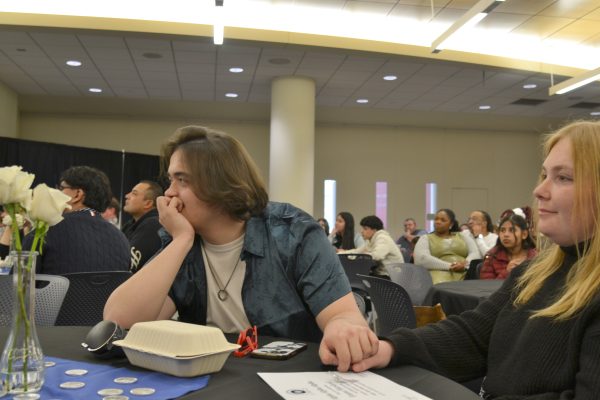Senior outraged by Hamline response
A student expresses her frustration in the aftermath of filing a sexual assault complaint.
Walker Fieldhouse, where Rachel Winter has to schedule safe times to use the facilities each semester.
February 18, 2016
The following is one student’s experience. Reporting cases of sexual misconduct is important—the Title IX offices offer many resources to assist students in reporting and, if they choose, filing a complaint.
She’s the President of the Anthropological Society, President of the Forensic Sciences Society, a Student Liaison for the Maya Society of Minnesota and a recipient of the Summer Undergraduate Collaborative Research Grant. She’s currently pursuing a departmental honors project, and she will be presenting her research at the National Conference for Undergraduate Research. She is one of sixty students in the country who has been selected to present her research on Capitol Hill for Posters on the Hill this spring, during which time she will also be Interning with the Midwest Medical Examiner’s Office.
She also spends much of her time on campus dodging the person who she says raped her two years ago.
“Today I saw him while I was leaving class, and I was like ‘Oh, no. Do not look up, do not make eye contact. Like, oh my God, he’s on campus.’ I know he’s on campus. I know he’s always here, but I don’t really have to run into him,” said senior Rachel Winter.
It was a year ago that Winter reported and filed a sexual assault complaint to the university. Since going through the Title IX processes, Winter has been frustrated by solutions that seem to make her life more difficult than the respondents. (Respondent is the term used to refer to the individual responding to a complaint, which is filed by the complainant. In this case, the complainant is Winter.)
There are two options within Hamline’s policy that students can follow using Hamline’s processes for moving forward with a complaint; one is investigative and the other is a voluntary resolution.
“In voluntary resolutions, students say what is needed and by working with both parties an agreement is made,” said Title IX Director and Associate Dean of Students Patti Klein. “These resolutions don’t include conduct sanctions but can include any type of educational opportunities and no-contact agreements.”
If students choose voluntary resolution, an investigation is still conducted. If students choose an investigative route, they’re still able to review the materials collected in that investigation and can add their own thoughts (in writing—students never have to appear before the review committee).
“Our goal is always to give a voice back to the person who filed a complaint,” said Klein. “In the voluntary process, the parties are directly involved with creating an agreement. This doesn’t have to be in person. In an investigation, the review committee makes the decision.”
Winter chose to present the review committee with three basic solutions that she would be comfortable with.
“I had a chance to write to the review board stating ‘here’s what I want, this is what I need to be comfortable on campus,’” said Winter. “In my ideal situation…I want him expelled. I don’t want to think about this everyday…I don’t want to have to restrict or modify my behavior because of his actions.”
If that was not possible, Winter’s second request was for the respondent’s involvement at Hamline to be limited to academia.
“My second tier…I wanted his access to campus restricted to classrooms and the library, so that he could continue his academics,” said Winter. “He doesn’t need to be [involved in athletics]—that doesn’t contribute to him being a successful student. I will acknowledge his right to an education, so give him that, but don’t give him anything else.”
If that was not possible either, Winter had only one request.
“My third thing was… [I wanted them to] restrict his access to Walker Fieldhouse entirely so that I can access that public space at anytime and feel safe,” said Winter. “They did none of those.”
The first review board gave Winter “priority access” to the fieldhouse—at the beginning of the semester she has to submit what hours she wants to work out and they have to be approved. According to Winter, there have been occasions where she’s been asked to adjust her hours to fit the respondent’s needs. The respondent is also not allowed to be in any of the same classes, which Winter says has never been an issue because they do not study the same things.
According to Klein, the question the review board asks if they’ve determined—based on the evidence presented to them—that the respondent violated the sexual misconduct policy is why they would allow that person to remain a student. If the decision is made not to suspend/expel the student, then the question is how do they ensure that the student has learned from the experience and there is no risk to the community.
“If someone is allowed to stay, [the review boards are trained to think about] what things that are going to be able to be put in place to make sure 1.) it never happens again and that the person is truly learning something through this experience, 2.) what’s in the needs and the interests of the other party and 3.) what’s in the best interest of the community. Those are things that are taken into account,” said Klein.
In this case, the respondent was allowed to remain active in athletics. According to Winter, the reason given to her by the review committee for that decision was that athletics was a healthy environment for the respondent to be a part of.
“He had to do trainings about consent, Green Dot workshops and other online training,” said Winter. “Isn’t that something that athletes are required to do at the beginning of the year as part of their orientation? Isn’t that something we all do as part of orientation when we come to Hamline?”
While every student who comes to Hamline is required to partake in sexual violence awareness training via an online source or as part of their first-year orientation, there are no specific requirements for different extra or co-curricular activities (such as athletics) imposed at the federal or university level. However, extra Green Dot trainings, or other workshops and programs are available to any student.
“Any of those organizations [extra or co-curricular] could request a special training, that would be geared towards them, and we’ve had some of those requests through our coaches,” said Klein.
According to Klein, Athletics have partnered with HUSC and other groups on campus to provide programs that are available to any student.
Receiving the decision of the first review board deeply upset Winter.
“When I got the first decision that he wasn’t expelled or kicked out of athletics… I was so upset that I skipped my three hour class that met once a week. I was balling, and I just couldn’t go to class,” said Winter. “I remember I was just really upset, and eating grapes really angrily for three hours.”
Students are allowed to appeal the decisions of the review committee once. There is one level of appeal in Hamline’s process, according to Klein. An appeals committee then reviews all of the information and can confirm the decision including sanctions or change the decision and sanctions. Winter decided to go through with an appeal.
“The second review board clarified things. If we’re both at an event and I see him, I can go tell a faculty member and [have them ask him to leave],” said Winter. “It’s still me having to monitor an event, and having to get somebody else involved to get him to leave.”
Winter has still managed to succeed at Hamline and enjoy her classes and relationships with faculty. But jumping through hoops lately has left her with little patience for the administrative, bureaucratic side of the university.
“There’s a whole bunch of little things that take time out of my day, and it’s so much more of an inconvenience to me now that I’ve reported it than it is for him,” said Winter. “Academically I love Hamline. The professors are incredible. The bureaucracy side of things is more of a thorn in my side.”






